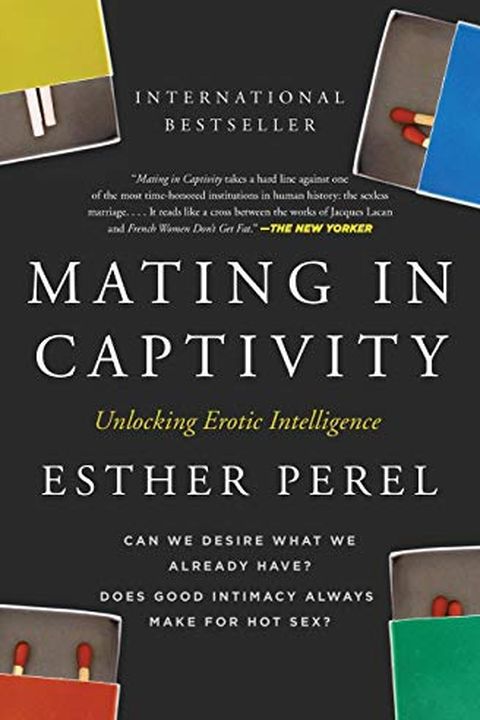Mating in Captivity Quotes
Today, we turn to one person to provide what an entire village once did: a sense of grounding, meaning, and continuity. At the same time, we expect our committed relationships to be romantic as well as emotionally and sexually fulfilling. Is it any wonder that so many relationships crumble under the weight of it all?.
Love rests on two pillars: surrender and autonomy. Our need for togetherness exists alongside our need for separateness.
Love is a vessel that contains both security and adventure, and commitment offers one of the great luxuries of life: time. Marriage is not the end of romance, it is the beginning.
The grand illusion of committed love is that we think our partners are ours. In truth, their separateness is unassailable, and their mystery is forever ungraspable. As soon as we can begin to acknowledge this, sustained desire becomes a real possibility. It’s remarkable to me how a sudden threat to the status quo (an affair, an infatuation, a prolonged absence, or even a really good fight) can suddenly ignite desire. There’s nothing like the fear of loss to make those old shoes look new again.
Our partner's sexuality does not belong to us. It isn't just for and about us, and we should not assume that it rightfully falls within our jurisdiction.
Beginnings are always ripe with possibilities, for they hold the promise of completion. Through love we imagine a new way of being. You see me as I’ve never seen myself. You airbrush my imperfections, and I like what you see. With you, and through you, I will become that which I long to be. I will become whole. Being chosen by the one you chose is one of the glories of falling in love. It generates a feeling of intense personal importance. I matter. You confirm my significance.
We are afraid that our adult sexuality will somehow damage our kids, that it’s inappropriate or dangerous. But whom are we protecting? Children who see their primary caregivers at ease expressing their affection (discreetly, within appropriate boundaries) are more likely to embrace sexuality with the healthy combination of respect, responsibility, and curiosity it deserves. By censoring our sexuality, curbing our desires, or renouncing them altogether, we hand our inhibitions intact to the next generation.
We're walking contradictions, seeking safety and predictability on one hand and thriving on diversity on the other.
Monogamy, it follows, is the sacred cow of the romantic ideal, for it is the marker of our specialness: I have been chosen and others renounced. When you turn your back on other loves, you confirm my uniqueness; when your hand or mind wanders, my importance is shattered. Conversely, if I no longer feel special, my own hands and mind tingle with curiosity. The disillusioned are prone to roam. Might someone else restore my significance.
We no longer plow the land together; today we talk. We have come to glorify verbal communication. I speak; therefore I am. We naively believe that the essence of who we are is most accurately conveyed through words.
In my work, I see couples who no longer wait for an invitation into their partner's interiority, but instead demand admittance, as if they are entitled to unrestricted access into the private thoughts of their loved ones.
We used to moralize; today we normalize, and performance anxiety is the secular version of our old religious guilt.
The extended family, the community, and religion may indeed have limited our freedom, sexual and otherwise, but in return they offered us a much-needed sense of belonging. For generations, these traditional institutions provided order, meaning, continuity, and social support. Dismantling them has left us with more choices and fewer restrictions than ever. We are freer, but also more alone. As Giddens describes it, we have become ontologically more anxious.
We don't like to be intimate alone. Some couples take this one step further, confusing intimacy with control. What passes for care is actually convert surveillance. ..
When the impulse to share becomes obligatory, when personal boundaries are no longer respected, when only the shared space of togetherness is acknowledged and private space is denied, fusion replaces intimacy and possession co-opts love.
Despite a 50 percent divorce rate for first marriages and 65 percent the second time around; despite the staggering frequency of affairs; despite the fact that monogamy is a ship sinking faster than anyone can bail it out, we continue to cling to the wreckage with absolute faith in its structural soundness.
If someone is counting on children to bring them peace of mind, self-confidence, or a steady sense of happiness, they are in for a bad shock. What children do is complicate, implicate, give plot lines to the story, color to the picture, darken everything, bring fear as never before, suggest the holy, explain the ferocity of the human mind, undo or redo some of the past while casting shadows into the future. There is no boredom with children in the home. The risks are high. The voltage crackling. —Anne Roiphe, Married.
